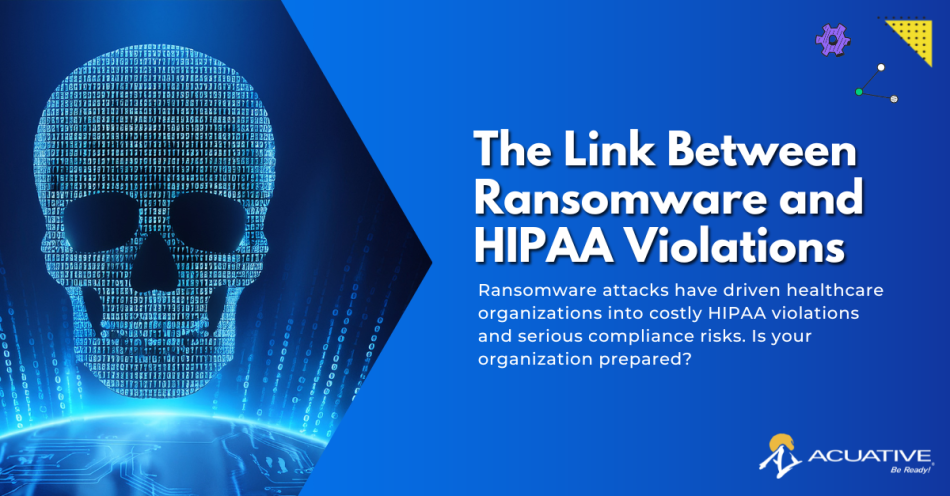In 2024, ransomware attacks on U.S. healthcare organizations surged, with over 67% of institutions reporting such incidents, nearly doubling the 34% threshold from 2021. (ISPartners) These attacks not only disrupt operations but also pose serious risks to compliance with the Health Insurance Portability and Accountability Act (HIPAA). Understanding this connection is crucial for healthcare providers aiming to safeguard patient data and maintain regulatory compliance.
Understanding HIPAA and Its Security Rule
HIPAA mandates that healthcare organizations implement safeguards to protect electronic Protected Health Information (ePHI). The Security Rule outlines three key areas:
- Administrative Safeguards: Policies and procedures to manage the selection, development, and implementation of security measures.
- Physical Safeguards: Protection of physical access to electronic systems and facilities.
- Technical Safeguards: Mechanisms to protect ePHI and control access to it.
Failure to adhere to these standards can result in violations, especially when cyberattacks like ransomware compromise ePHI.
How Ransomware Leads to HIPAA Violations
Ransomware attacks create a direct pathway to HIPAA violations by compromising the confidentiality, integrity, and availability of electronic Protected Health Information (ePHI). When attackers encrypt critical data, healthcare organizations can no longer access patient records, violating the availability requirement under the Security Rule. In cases where ransomware actors exfiltrate sensitive data, the confidentiality of ePHI is breached, triggering the mandatory breach notification requirements. Beyond the immediate technical impact, organizations that fail to conduct timely risk assessments or maintain adequate safeguards may be deemed to exhibit “willful neglect,” which carries severe penalties. Even delays in responding to or reporting breaches can exacerbate the regulatory consequences, illustrating that ransomware is not just a technical problem, but a compliance issue as well.
Real-World Examples of Ransomware and HIPAA Violations
Several high-profile incidents underscore how ransomware can translate into HIPAA violations. For example, the Guam Memorial Hospital Authority (GMHA) experienced a ransomware attack in 2024 that disrupted access to patient records. During the subsequent review, the U.S. Department of Health and Human Services (HHS) determined that GMHA had not conducted a recent risk analysis, which is a key HIPAA requirement. This oversight resulted in a settlement due to potential HIPAA violations. (HHS)
Similarly, in January 2025, the New York Blood Center Enterprises (NYBCe) suffered a breach affecting nearly 194,000 individuals, exposing sensitive data including Social Security numbers and medical test results. While the exact vector of the attack is still under investigation, the incident highlights how ransomware can compromise sensitive health information and create serious regulatory exposure for healthcare organizations. (HIPAA Journal) These examples demonstrate the real and tangible consequences that ransomware attacks pose, not only in terms of operational disruption but also in terms of compliance risk and potential financial penalties.
Consequences of HIPAA Violations Due to Ransomware
The repercussions of ransomware-induced HIPAA violations are severe:
- Financial Penalties: Civil monetary penalties for HIPAA violations can range from $141 to $571,162 per violation, with annual maximums reaching over $2 million.
- Reputational Damage: Loss of patient trust can lead to decreased patient retention and potential loss of business.
- Operational Disruption: Ransomware attacks can halt clinical operations, affecting patient care and organizational efficiency.
How MSSPs Ensure Cybersecurity Compliance
For healthcare organizations, partnering with a managed security service provider (MSSP) can be a strategic decision to strengthen cybersecurity and maintain regulatory compliance. MSSPs bring specialized expertise, round-the-clock monitoring, and proactive risk management, helping organizations protect sensitive data while reducing operational strain on internal IT teams. By leveraging an MSP/MSSP, healthcare providers can focus on delivering quality patient care while ensuring that their cybersecurity posture meets HIPAA and other regulatory requirements.
Acuative specializes in providing managed IT services that align with HIPAA requirements, ensuring healthcare organizations remain compliant and protected against cyber threats. Our offerings include comprehensive risk assessments to identify vulnerabilities, 24/7 monitoring and threat detection to respond to threats promptly, employee training programs to reduce human error, and robust data backup and recovery solutions. Additionally, we assist organizations with compliance audits and reporting, helping prepare for regulatory inspections and maintain proper documentation.
By partnering with Acuative, healthcare providers can strengthen their cybersecurity posture, mitigate risk, and ensure ongoing HIPAA compliance, reducing the likelihood of ransomware disruptions or costly violations. Our team’s expertise ensures that security and compliance are integrated seamlessly into your operations, giving healthcare organizations the confidence to focus on patient care while we handle the cybersecurity and regulatory challenges.
Don’t wait until it’s too late. Let’s have the conversation today.
About Bennett Ruiz

With over 20 years of experience, Bennett Ruiz is a seasoned executive with a strong background in Telecom, Mobility, Marketing, and Advertising. His expertise spans sales, go-to-market strategy, CRM, digital marketing, and professional services. He has successfully led business development and strategic initiatives across global markets. A graduate of Harvard University and the Advanced Management Program at IESE Business School – University of Navarra, he is known for driving growth and innovation, and bringing a results-oriented approach to every challenge.

